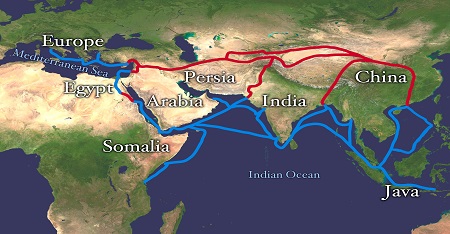)AFP) A glossy highway and hundreds of lorries transporting Chinese workers by the thousands: the new Silk Road is under construction in northern Pakistan, but locals living on the border are yet to be convinced they will receive more from it than dust.
The town of Sost is gateway to millions in customs duties, with its rickety stalls of corrugated iron, its cross-border secret agents and its dusty petrol station's abrupt service. It is the first stop along a new $46 billion "economic corridor" designed by China in Pakistan.
Drivers from China arrive through the Khunjerab Pass, the world's highest paved border crossing at 4,600 metres (15,000 feet) above sea level, and unload their goods encircled by the magnificent Karakoram mountains.
From there, Pakistani colleagues pick it up and transport them the length of the country — currently to Karachi, but in the future to Gwadar, where Beijing has been given management of the port in a grand project allowing China greater access to the Middle East, Africa and Europe.
But, until recently, the highway was cut off south of Sost, blocked for five years by a landslide that dammed the Hunza river.
Unable to drive around the mountain, China simply tunnelled through it, sending thousands of workers in a titanic effort that took more than three years and cost at least $275 million.[caption id="attachment_88524" align="alignright" width="450"] Main routes of the Silk Road. Pic courtesy - https://en.wikipedia.org/wiki/Silk_Road[/caption]
Main routes of the Silk Road. Pic courtesy - https://en.wikipedia.org/wiki/Silk_Road[/caption]
"We have suffered because of the lake," joked Amjad Ali, a round-faced trader in the Sost bazaar. Before the tunnel, residents of Sost had to cross the lake by boat in a journey that took at least an hour. "With the tunnel, we hope business will take off and tourists flock here," said Ali. But their optimism is tempered by fear that the trucks will drive on by, leaving Sost to receive, as Ali put it, "nothing but dust".
"The Chinese care only for their own interest," said Noor-e-din, another trader. Islamabad, he predicted, is set to collect millions in customs duty from Sost while doing little or nothing for the town.
Sitting on the border of his potato field under the shade of an apple tree, Ali Qurban fears losing his beloved region in Islamabad's dance with Beijing.
"This is my land of Gilgit-Baltistan — not that of Pakistan or China," the local activist and occasional poet cries.
But for the head of local government, Hafiz Hafeez ur-Rehman, the project is a "game-changer" for a region that should be the "prime beneficiary" as it is located on the threshold of China.
The government plans to install commercial areas and invest in hydroelectric dam projects along the future super-highway to the south, he said.AFP
Leave Comments